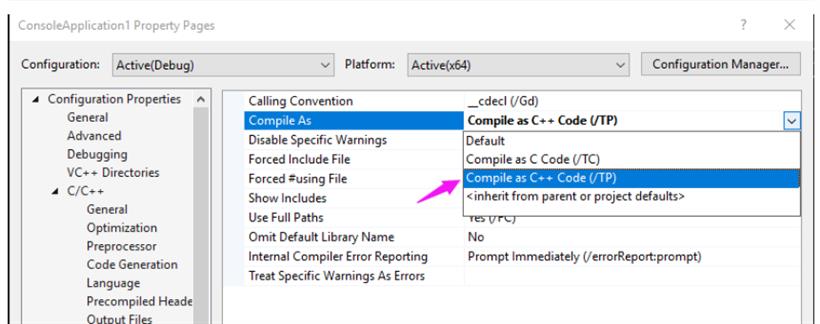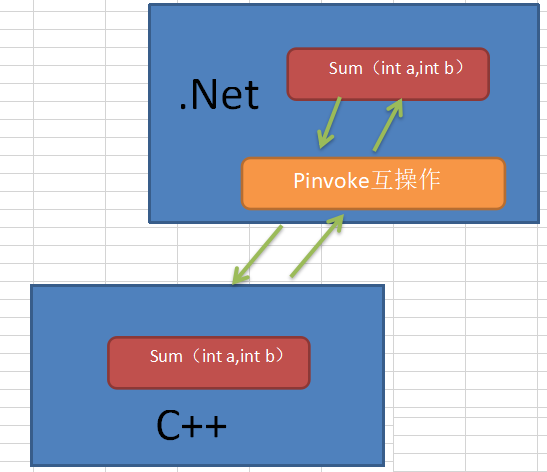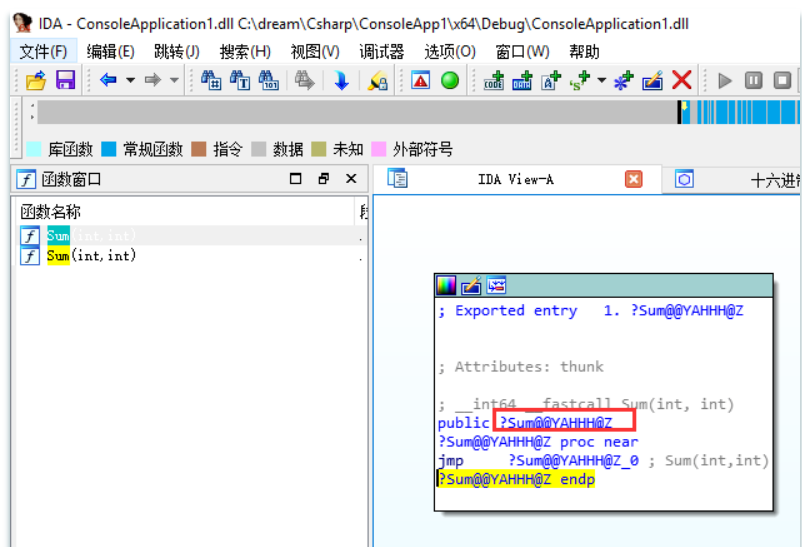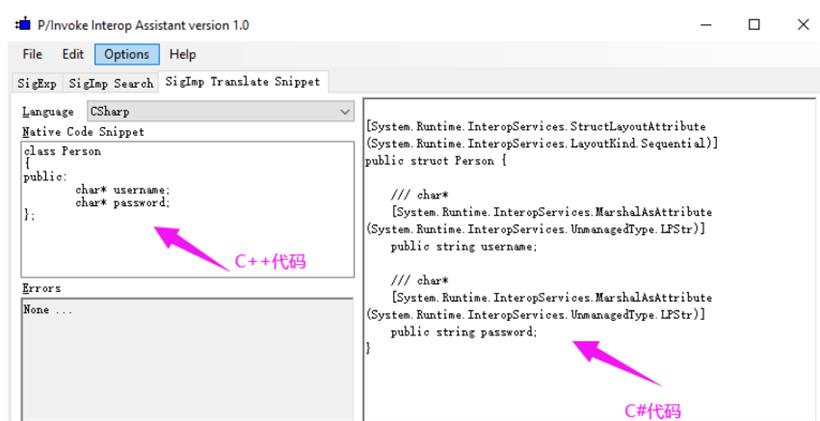- 联系我们
- duidaima.com 版权声明
- 闽ICP备2020021581号
-
 闽公网安备 35020302035485号
闽公网安备 35020302035485号
 闽公网安备 35020302035485号
闽公网安备 35020302035485号
[DllImport("QCall", CharSet = CharSet.Unicode)]
[SecurityCritical]
[SuppressUnmanagedCodeSecurity]
private static extern bool InternalUseRandomizedHashing();
[DllImport("mscoree.dll", EntryPoint = "ND_RU1")]
[SuppressUnmanagedCodeSecurity]
[SecurityCritical]
public static extern byte ReadByte([In] [MarshalAs(UnmanagedType.AsAny)] object ptr, int ofs);
联想到上一篇阿里短信netsdk也是全用C++实现,然后用C#做一层壳,两者相互打辅助彰显更强大的威力,还有很多做物联网的朋友对这种.Net互操作技术太熟悉不过了,很多硬件,视频设备驱动都是用C/C++实现,然后用winform/WPF去做管理界面,C++还是在大学里学过,好多年没接触了,为了练手这一篇用P/Invoke来将两者相互打通。



--- Person.cpp
extern "C"
{
_declspec(dllexport) int Sum(int a, int b);
}
--- Person.h
#include "Person.h"
#include "iostream"
using namespace std;
int Sum(int a, int b){
return a + b;
}
有一个注意的地方就是 extern "C",一定要用C方式导出,如果按照C++方式,Sum名称会被编译器自动修改,不信你把extern "C"去掉,我用ida打开给你看一下,被修改成了 ?Sum@@YAHHH@Z, 尴尬。
class Program
{
[DllImport("ConsoleApplication1.dll", CallingConvention = CallingConvention.Cdecl)]
extern static int Sum(int a, int b);
static void Main(string[] args)
{
var result = Sum(10, 20);
Console.WriteLine($"10+20={result}");
Console.ReadLine();
}
}
---- output -----
10+20=30
2. 字符串的互操作
--- Person.cpp
extern "C"
{
//字符串
_declspec(dllexport) int GetLength(char* chs);
}
--- Person.h
#include "Person.h"
#include "iostream"
using namespace std;
int GetLength(char* chs){
return strlen(chs);
}
然后我们看一下C#这边怎么写,通常string在C++中使用asc码,而C#中是Unicode,所以在DllImport中加一个CharSet指定即可。 class Program
{
[DllImport("ConsoleApplication1.dll", CallingConvention = CallingConvention.Cdecl, CharSet = CharSet.Ansi)]
extern static int GetLength([MarshalAs(UnmanagedType.LPStr)] string str);
static void Main(string[] args)
{
var str = "hello world";
Console.WriteLine($"length={GetLength(str)}");
Console.ReadLine();
}
}
---- output -----
length=11

--- Person.cpp
extern "C"
{
class Person
{
public:
char* username;
char* password;
};
_declspec(dllexport) char* AddPerson(Person person);
}
--- Person.h
#include "Person.h"
#include "iostream"
using namespace std;
char* AddPerson(Person person){
return person.username;
}
可以看到C++中AddPerson返回了char*,在C#中我们用IntPtr来接,然后用Marshal将指针转换string,接下来用工具生成好的C#代码拷到项目中来,如下: [System.Runtime.InteropServices.StructLayoutAttribute(System.Runtime.InteropServices.LayoutKind.Sequential)]
public struct Person
{
/// char*
[System.Runtime.InteropServices.MarshalAsAttribute(System.Runtime.InteropServices.UnmanagedType.LPStr)]
public string username;
/// char*
[System.Runtime.InteropServices.MarshalAsAttribute(System.Runtime.InteropServices.UnmanagedType.LPStr)]
public string password;
}
class Program
{
[DllImport("ConsoleApplication1.dll", CallingConvention = CallingConvention.Cdecl, CharSet = CharSet.Ansi)]
extern static IntPtr AddPerson(Person person);
static void Main(string[] args)
{
var person = new Person() { username = "dotnetfly", password = "123456" };
var ptr = AddPerson(person);
var str = Marshal.PtrToStringAnsi(ptr);
Console.WriteLine($"username={str}");
Console.ReadLine();
}
}
---------- output ------------
username=dotnetfly
4. 回调函数(异步)的处理--- Person.cpp
extern "C"
{
//函数指针
typedef void(_stdcall* PCALLBACK) (int result);
_declspec(dllexport) void AsyncProcess(PCALLBACK ptr);
}
--- Person.h
#include "Person.h"
#include "iostream"
using namespace std;
void AsyncProcess(PCALLBACK ptr){
ptr(10); //回调C#的委托
}
从代码中看到,PCALLBACK就是我定义了函数指针,接受int参数。 class Program
{
delegate void Callback(int a);
[DllImport("ConsoleApplication1.dll", CallingConvention = CallingConvention.Cdecl)]
extern static void AsyncProcess(Callback callback);
static void Main(string[] args)
{
AsyncProcess((i) =>
{
//这里回调函数哦...
Console.WriteLine($"这是回调函数哦: {i}");
});
Console.ReadLine();
}
}
------- output -------
这是回调函数哦: 10